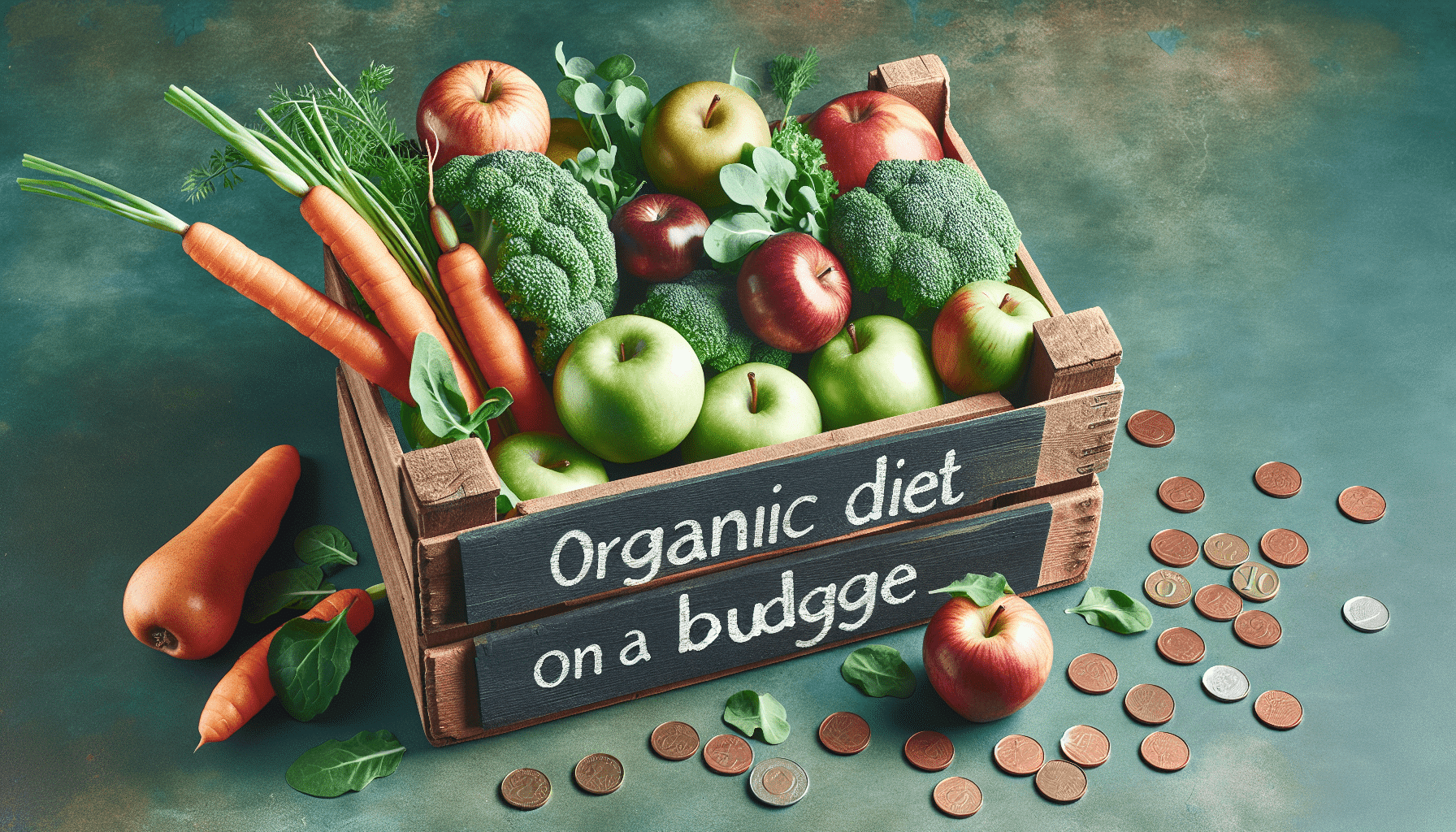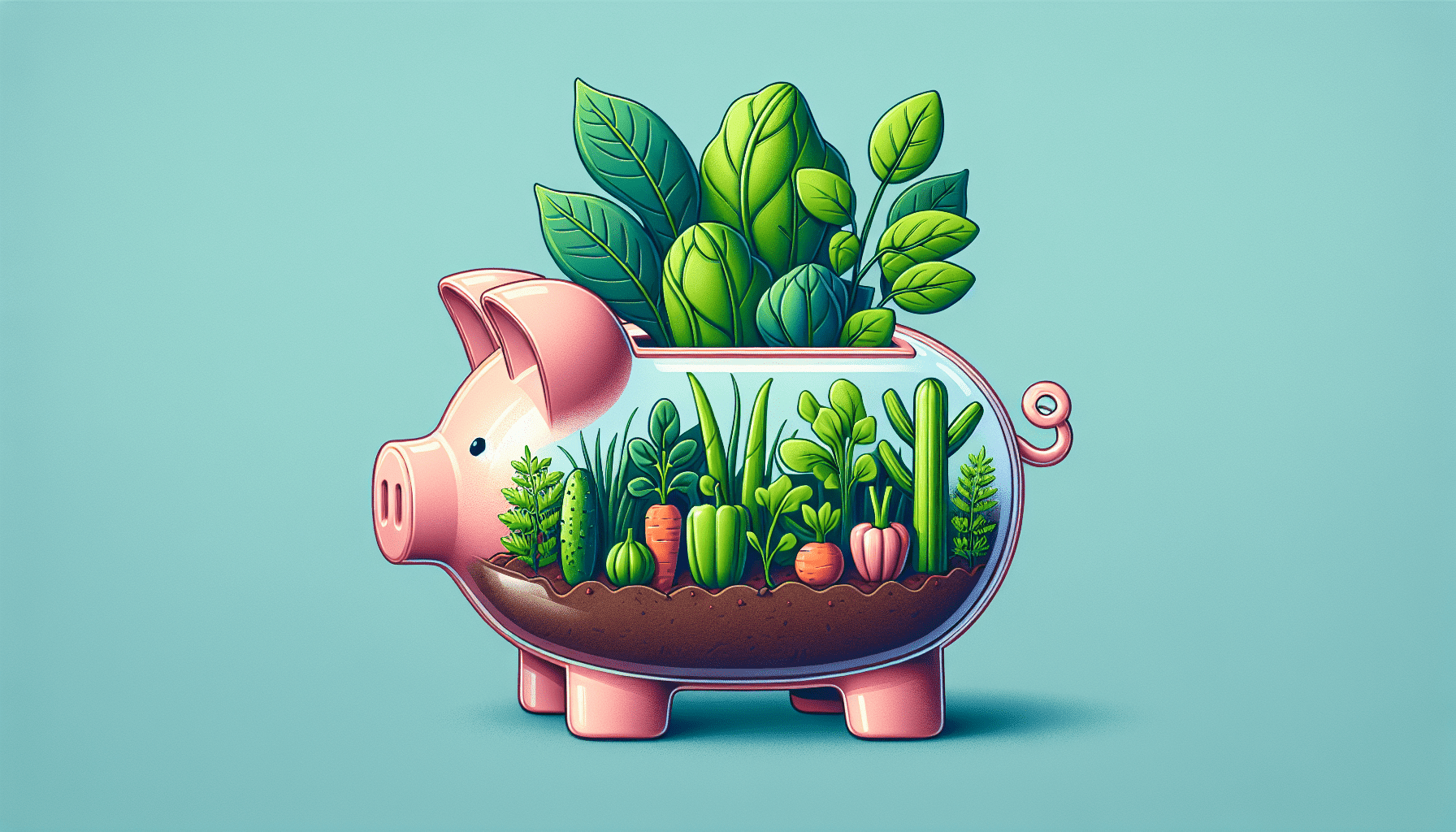Organic eating has become increasingly popular in recent years due to its numerous health benefits. However, many people believe that eating organically is expensive and inaccessible. But fear not! In this article, you will discover practical tips that will help you incorporate organic food into your diet without breaking the bank. By following these strategies, you can enjoy the advantages of organic eating while staying within your budget.
Shop at Local Farmers Markets
Supporting local farmers is not only good for the community, but it can also save you money. By shopping at local farmers markets, you are directly contributing to the livelihood of small-scale farmers in your area. These farmers often use organic practices, making their produce a healthier choice for you and the environment. Additionally, local farmers markets offer a wide variety of fresh and seasonal produce that you may not find in traditional grocery stores. Not only will you get to enjoy unique and flavorful fruits and vegetables, but you may also find better prices compared to big supermarkets.
Get Fresher Produce
One of the main advantages of shopping at local farmers markets is the freshness of the produce. When you buy directly from local farmers, you are getting fruits and vegetables that have been recently harvested or picked. This means that the produce is at its peak of ripeness and flavor, providing you with a superior dining experience. In contrast, store-bought produce often travels long distances and can spend days or even weeks in storage before reaching the shelves. By choosing to buy from local farmers, you are ensuring that you are getting the freshest and best-tasting organic produce available.
Find Better Deals
Contrary to popular belief, shopping at local farmers markets can actually be cost-effective. While some may assume that farmers markets are more expensive, this is not always the case. In fact, many farmers markets offer competitive prices and even discounts on certain items. By cutting out the middleman, farmers can price their produce more competitively compared to large grocery chains. Additionally, some farmers may offer deals on produce that is slightly bruised or not as visually perfect, but still perfectly good to eat. By being open to imperfect produce, you can save even more money while supporting local farmers and reducing food waste.
Buy in Bulk
A tried and true method of saving money on organic groceries is buying in bulk. Many natural food stores and co-ops offer discounts when you purchase larger quantities of items. This is especially beneficial for staple items such as grains, beans, nuts, and seeds. By buying in bulk, not only are you getting a better price per pound, but you are also reducing packaging waste. Instead of purchasing multiple smaller packages, you can bring your own reusable containers and fill them up directly from the bulk bins. This not only saves money in the long run but also helps the environment by minimizing the amount of packaging that ends up in landfills.

Stock up on Staple Items
In addition to buying in bulk, stocking up on staple items can be a great way to save money on organic groceries. Staple items such as rice, pasta, canned goods, and dried beans have a longer shelf life and can be bought in larger quantities, ensuring that you always have the basics on hand. By purchasing these items in bulk when they are on sale, you can save money and avoid having to frequently buy them at full price. Having well-stocked pantry staples means that you can plan meals and create nutritious dishes with ease, without having to run to the store every time you need an ingredient.
Reduce Packaging Waste
Another benefit of buying in bulk is the reduction in packaging waste. Many pre-packaged organic options come in excessive amounts of plastic or cardboard packaging, which is not only harmful to the environment but also adds to the cost of the product. By purchasing in bulk and using your own reusable containers, you are minimizing the amount of packaging waste that ends up in landfills. This small change can have a big impact over time, not only on your wallet but also on the planet. By consciously reducing packaging waste, you are making a sustainable choice while saving money on your organic groceries.
Join a Community Supported Agriculture (CSA) Program
Community Supported Agriculture (CSA) programs are a fantastic way to get fresh, organic produce directly from local farms. When you join a CSA, you typically pay a subscription fee to a farm at the beginning of the growing season. In return, you receive a weekly or bi-weekly supply of produce throughout the season. CSA programs offer a variety of benefits, including cost savings and access to a wide range of seasonal produce. By subscribing to a CSA, you are supporting local farmers, ensuring that they have a stable income, and often getting more affordable organic produce compared to purchasing the same items individually.
Get Organic Produce Directly from Local Farms
One of the main advantages of participating in a CSA program is the ability to get organic produce directly from local farms. Many CSA farms follow organic practices, which means that their produce is grown without synthetic pesticides, herbicides, or genetically modified organisms. By getting your produce directly from these farms, you can be confident that you are eating food that is not only good for you but also better for the environment. Additionally, CSA programs often provide their members with a wide variety of fruits and vegetables, allowing you to try new and seasonal produce that you may not otherwise come across at your local grocery store.

Save Money through Subscription
One of the great things about CSA programs is that they often provide cost savings compared to purchasing organic produce individually. By paying a subscription fee upfront, you are essentially investing in the farm and helping cover their costs for the season. This allows the farmers to offer their produce at a lower price compared to what you would find at a grocery store. Depending on the size of the CSA and the length of the season, you can save a significant amount of money by joining a CSA program. In addition to the financial savings, you are also supporting local farmers and contributing to the sustainability of your community.
Explore New and Seasonal Produce
Participating in a CSA program can be an exciting way to explore new and seasonal produce. As a member of a CSA, you will receive a variety of fruits and vegetables based on what is currently being harvested. This means that each week you will be introduced to different items, some of which you may have never tried before. By exposing yourself to a wider range of produce, you can expand your culinary horizons and discover new favorite dishes. Not only does this make cooking and meal planning more interesting, but it also ensures that you are getting a diverse array of nutrients from your organic produce, promoting a healthy and balanced diet.
Grow Your Own Food
If you have the space and time, growing your own food can be an incredibly rewarding and cost-effective way to incorporate organic eating into your life. Starting a small garden, whether it's in your backyard, balcony, or even indoors, allows you to have full control over the growing process. You can choose to use organic methods, avoiding the use of harmful pesticides and chemicals. By growing your own herbs, vegetables, and even fruits, you are not only ensuring that you have access to fresh and organic produce, but you can also save money on your grocery bills.
Start a Small Garden
Starting a small garden is easier than you may think, even if you don't have a lot of outdoor space. Container gardening is a great option for those with limited space, as you can grow plants in pots or other containers on your porch, balcony, or even indoors. Choose vegetables and herbs that grow well in small spaces, such as tomatoes, peppers, lettuce, basil, and mint. With proper care and a little patience, you will soon have a bountiful supply of fresh produce right at your fingertips. Not only will you save money by growing your own food, but you will also enjoy the satisfaction of eating something that you nurtured from seed to plate.

Save Money on Groceries
Growing your own food can lead to significant savings on your grocery bills. While starting a garden does require some initial investment in seeds, soil, and containers, the long-term benefits outweigh the costs. By growing your own vegetables and herbs, you can avoid the high prices often associated with organic produce. Additionally, you can harvest only what you need, reducing food waste and ensuring that you always have fresh ingredients on hand. Plus, there is nothing quite like the taste of homegrown produce – it's often more flavorful and nutrient-rich, making it a truly rewarding experience for both your taste buds and your wallet.
Plan Your Meals
Meal planning is a crucial aspect of organic eating on a budget. By taking the time to plan your meals in advance, you can utilize ingredients effectively and reduce food waste. Start by creating a weekly meal plan, identifying the recipes you want to make and the ingredients required for each dish. Take into account the produce you already have on hand to avoid purchasing unnecessary items. When shopping, stick to your meal plan and buy only the ingredients you need, preventing impulse buys and reducing the risk of food spoilage. By planning your meals, you are not only saving money but also ensuring that you have nutritious and delicious meals throughout the week.
Utilize Ingredients Effectively
To make the most out of your organic groceries, it's important to utilize ingredients effectively. This means finding creative ways to use every part of the produce and minimizing waste. For example, if you buy a bunch of carrots, you can use the tops to make a pesto or add them to salads, while the carrots themselves can be roasted, steamed, or added to various dishes. Similarly, if you buy a whole chicken, you can use the meat for one meal and then use the bones to make a flavorful broth for soups or stews. By being mindful of how you use your ingredients, you can make the most out of every dollar spent and reduce food waste in the process.
Reduce Food Waste
Reducing food waste is not only environmentally responsible but also can save you money. Organic produce, in particular, tends to spoil more quickly than conventionally grown produce due to the absence of preservatives. Therefore, it's important to take steps to minimize food waste. One way to do this is by properly storing your organic produce. Learn the best storage techniques for each type of fruit or vegetable to keep them fresh for longer. Additionally, keep an eye on the expiration dates of perishable items and plan your meals accordingly. By reducing food waste, you are not only stretching your grocery budget but also contributing to a more sustainable food system.

Cook from Scratch
Cooking from scratch is an essential habit for those looking to eat organically on a budget. By avoiding processed foods and cooking at home, you have control over the ingredients that go into your meals. Instead of buying pre-packaged organic snacks or meals, opt for whole foods and cook them yourself. This allows you to use fresh, organic ingredients, resulting in meals that are not only healthier but also taste better. Plus, cooking from scratch can be a fun and rewarding experience. You can experiment with new recipes, flavors, and techniques, expanding your culinary skills while saving money and prioritizing your health.
Avoid Processed Organic Foods
While it's true that many processed organic foods are available on the market, they can be quite expensive. These items often come with a premium price tag due to the additional costs associated with organic certification and higher-quality ingredients. By avoiding processed organic foods and focusing on whole foods, you can save money without sacrificing your commitment to organic eating. Instead of buying pre-made organic meals or snacks, opt for ingredients that allow you to make your own dishes from scratch. Not only will you save money, but you will also have complete control over the quality and nutritional value of your meals.
Experiment with New Recipes
Cooking at home gives you the opportunity to experiment with new recipes and flavors. As you explore the world of organic eating, don't be afraid to try new dishes and cuisines. Look for recipes that utilize affordable, seasonal ingredients and experiment with different cooking methods and spices. Trying new recipes not only keeps your meals exciting and varied but also expands your culinary skills and knowledge. By incorporating more diverse flavors and ingredients into your meals, you are enriching your diet and making organic eating more enjoyable and sustainable in the long run.
Choose Less Expensive Organic Options
Contrary to popular belief, not all organic produce is expensive. By focusing on affordable organic options, you can eat organic on a budget. While some organic fruits and vegetables may be more expensive than their conventional counterparts, there are plenty of affordable options available. For example, root vegetables like carrots, potatoes, and onions are often reasonably priced, as are bananas, cabbage, and frozen berries. Additionally, consider purchasing frozen or canned organic goods, as they can be more cost-effective compared to fresh produce. By being selective in your organic choices, you can enjoy the benefits of organic eating without breaking the bank.

Opt for Frozen or Canned Organic Goods
Frozen and canned organic goods are a great alternative to fresh produce, especially when it comes to reducing costs. These items are often more affordable, have a longer shelf life, and provide convenience when meal planning. Frozen fruits and vegetables are typically harvested at their peak ripeness and quickly frozen, preserving their nutritional value. Canned goods, such as beans, tomatoes, and corn, offer convenience and can be easily incorporated into a variety of dishes. By considering frozen or canned options, you can enjoy the benefits of organic eating without compromising your budget or the quality of your meals.
Shop at Discount Stores or Online
Another way to save money on organic groceries is to shop at discount stores or online retailers. Many discount stores now offer a wide selection of organic products at more affordable prices compared to traditional grocery stores. These stores often purchase products in bulk or directly from manufacturers, allowing them to pass on the savings to consumers. Additionally, online shopping can provide access to a wider range of organic options and allow you to compare prices more easily. By exploring alternative shopping options, you can find affordable organic products without compromising on quality or nutrition.
Preserve and Store Fresh Produce
To extend the life of your organic produce and reduce food waste, it's essential to learn proper storage techniques. Many fruits and vegetables have specific storage requirements to maintain their freshness and nutritional value. For example, leafy greens tend to wilt quickly and are best stored in a damp cloth or airtight container in the refrigerator. On the other hand, root vegetables like potatoes and beets prefer a cool and dark place. By understanding how to store your organic produce properly, you can minimize spoilage and enjoy the full lifespan of your fruits and vegetables.
Minimize Food Spoilage
Organic produce can be more susceptible to spoilage compared to conventionally grown counterparts due to the absence of preservatives. To minimize food spoilage, it's important to handle your organic groceries with care and use them before they go bad. Plan your meals in advance and prioritize using the most perishable ingredients first. If you have excess produce that you won't be able to use in time, consider freezing or preserving it for future use. By being mindful of food spoilage and taking steps to minimize waste, you can make the most out of your organic groceries and save money in the process.
Extend the Life of Organic Produce
Proper storage techniques and minimizing food spoilage can help you extend the life of your organic produce. By following best practices for storing fruits and vegetables, you can keep them fresh for longer, eliminating the need to frequently replenish your grocery supply. For example, storing apples separately from other fruits can prevent them from ripening too quickly and spoiling. Similarly, keeping onions and potatoes in separate, cool, and dark spaces can prevent them from sprouting or going bad prematurely. By taking the time to properly store your organic produce, you can maximize its shelf life and reduce the frequency of your grocery shopping trips.
Use Whole Foods for Nutritional Value
When it comes to organic eating, focusing on whole foods is key. Whole foods, such as whole grains, legumes, fruits, and vegetables, offer superior nutritional value compared to processed snacks or pre-packaged meals. By incorporating more whole foods into your diet, you can ensure that you are getting a wide array of essential vitamins, minerals, and fiber. Opt for whole grain options like brown rice, quinoa, and whole wheat pasta, which not only provide more nutrients but also tend to be less expensive compared to processed alternatives. By prioritizing whole foods, you are making a nutritious and budget-friendly choice for your organic eating journey.
Opt for Whole Grains and Legumes
Whole grains and legumes are fantastic options for incorporating more whole foods into your organic diet. Not only are they cost-effective, but they are also rich in fiber, vitamins, and minerals. Whole grains like oats, brown rice, barley, and quinoa can be used as the base for a variety of meals, from breakfast porridges to hearty grain bowls. Legumes such as lentils, chickpeas, and black beans are not only packed with protein but are also versatile ingredients in soups, stews, salads, and dips. By incorporating these pantry staples into your meals, you are adding nutritional value and staying on budget with your organic eating goals.
Choose Nutrient-Dense Foods
When it comes to organic eating, choosing nutrient-dense foods is essential. Nutrient-dense foods are those that provide a high amount of vitamins, minerals, and other beneficial compounds relative to their calorie content. By focusing on these foods, you can maximize the nutritional value of your meals without compromising your budget. Dark leafy greens like kale and spinach, for example, are packed with vitamins A and C, as well as iron, calcium, and fiber. Berries, such as blueberries and strawberries, are low in calories but high in antioxidants, vitamins, and fiber. By incorporating more nutrient-dense foods into your organic diet, you are making a smart investment in your health while staying within your budget.
Avoid Processed Organic Snacks
While organic snacks may be tempting, they can be quite expensive and may not offer the same nutritional value as whole foods. Many processed organic snacks are high in added sugars, unhealthy fats, and artificial ingredients, negating the benefits of choosing organic. Instead of reaching for pre-packaged organic snacks, opt for whole fruits, nuts, or homemade granola bars. These options are not only more affordable but also offer more natural and nutritious alternatives. By avoiding processed organic snacks and focusing on whole foods, you can better manage your budget while prioritizing your health and well-being.
Reduce Meat Consumption
Reducing meat consumption is not only good for your health but can also save you money while promoting sustainability. Organic meat tends to be more expensive compared to conventionally produced meat due to the higher costs associated with organic farming practices. By exploring plant-based protein sources such as beans, lentils, tofu, and tempeh, you can reduce your reliance on expensive organic meats without compromising on nutrition or taste. Consider incorporating meatless meals into your weekly meal plan to further reduce costs and explore the world of plant-based cuisine. By consuming less meat, you are not only saving money but also making a positive impact on the environment and your overall well-being.
Explore Plant-Based Protein Sources
Plant-based protein sources offer a cost-effective and sustainable alternative to organic meat. Beans, lentils, chickpeas, and other legumes are not only rich in protein but also provide essential vitamins, minerals, and dietary fiber. Tofu and tempeh are also great sources of plant-based protein and can be used in a variety of dishes. By exploring different plant-based protein sources, you can create delicious and satisfying meals while saving money on your grocery bill. Additionally, plant-based protein sources often have a smaller environmental footprint compared to animal-based protein, making them a more sustainable choice for your organic eating journey.
Buy Organic Meat in Smaller Quantities
If you do choose to consume organic meat, buying it in smaller quantities can help you stay within your budget. Organic meat can be quite expensive, so it's important to be mindful of portion sizes and prioritize quality over quantity. Instead of buying a large cut of organic meat that might go to waste or break the bank, consider purchasing smaller portions or cuts that can be used in multiple meals. By practicing portion control and incorporating other protein sources such as legumes, you can enjoy the benefits of organic meat without overspending. Responsible consumption is key to making organic eating sustainable and affordable.

